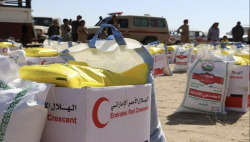How big a threat is Omicron?
- 2021-12-09 12:08:19


 Pierre Rayer: Art, Science, and Happiness: The Universal Mission of Transmission to Future Generations through Patronage at the Louvre Abu Dhabi
Pierre Rayer: Art, Science, and Happiness: The Universal Mission of Transmission to Future Generations through Patronage at the Louvre Abu Dhabi Ahly crowned Super champions after dramatic extra-time win over Modern Future FC
Ahly crowned Super champions after dramatic extra-time win over Modern Future FC Yemeni Honey..A Development Wealth Threatened By Conflict And Climate Change
Yemeni Honey..A Development Wealth Threatened By Conflict And Climate Change California wildfires: Millions warned of possible power cut
California wildfires: Millions warned of possible power cut Central African rebels launch attacks near capital
Central African rebels launch attacks near capital UAE FM Abdullah bin Zayed Holds Phone Call with U.S. Secretary of State Marco Rubio on Yemen Developments
UAE FM Abdullah bin Zayed Holds Phone Call with U.S. Secretary of State Marco Rubio on Yemen Developments UN Warns Against a Siege on Mukalla: Growing Humanitarian Concerns
UN Warns Against a Siege on Mukalla: Growing Humanitarian Concerns The UAE and Its Role in Yemen… A Decade of Giving
The UAE and Its Role in Yemen… A Decade of Giving Rubio, Saudi FM Discuss Yemen Tensions and Regional Security
Rubio, Saudi FM Discuss Yemen Tensions and Regional Security Bahrain Commends Saudi and UAE Role in Supporting Yemen’s Stability
Bahrain Commends Saudi and UAE Role in Supporting Yemen’s Stability
